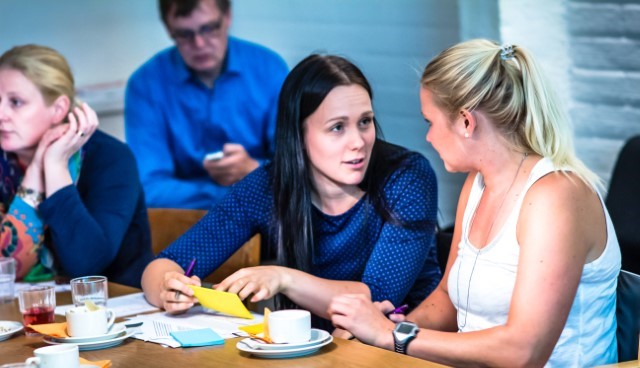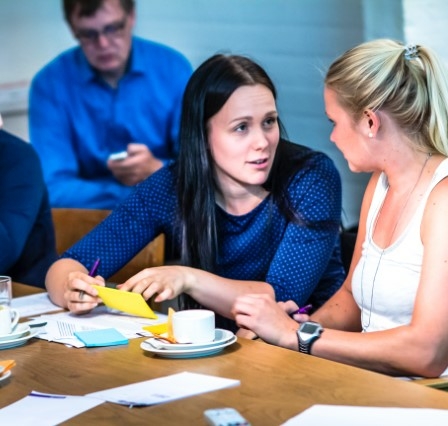In the last two years, the participation of regions in the battle against climate change has been moving at a fast pace in Finland. Four Finnish cities are showing others how to be successful and build well-being while reducing emissions. The cities have set ambitious targets for themselves: they are committed to becoming carbon neutral and waste free, and to limiting their ecological footprint to the earth’s carrying capacity by 2050 at the latest.
The sustainable development efforts have been supported by Sitra and the City of Jyväskylä’s joint project “Towards resource wisdom”, which has involved developing an operating model for promoting resource wisdom in medium-sized and large cities and municipalities. The operating model is used to embed resource wisdom in the community as a whole, ranging from the strategy work of city management to the everyday lives of city residents.
Jyväskylä is the centre of the Central Finland region, a traditional university city of around 135,000 inhabitants. During the project, the residents of Jyväskylä were invited to use a web portal to submit ideas on how to reduce environmental harm and improve social and economic well-being. A total of 212 ideas were received, of which 14 were put into practice, and an impact assessment of their effectiveness in curbing emissions and the combating overconsumption of natural resources was carried out.
The residents played an active role in this: overall, some 25,000 people took part in testing resource-wise ideas in practice.
In one of the projects implemented in Jyväskylä, five households – of varying size and representing different life situations – took a leap into the future. They tested various ways of reducing the consumption of natural resources in their everyday lives for one month. The families managed to significantly reduce their consumption of natural resources and their generation of carbon emissions during the practical trial. The biggest positive environmental effects were achieved through new transport solutions, such as car sharing within housing co-operatives and dietary changes.
The great thing was that the families enjoyed making the changes.
“Each grocery run saves us almost two hours of personal time, which we highly appreciate,” said Salla Pehkonen, a mother of two who participated in the practical trial.
The Pehkonen family experimented with ordering their groceries through a service that delivers from the store to the customer’s front door. This service reduces the need to use private cars and other transport – and saves customers time and effort. The service impressed the Pehkonen family, who have continued to use it after the project, encouraging their neighbours and friends to do likewise.
One idea for reducing avoidable food waste generated by public kitchens – called the leftover lunch – was also tested in Jyväskylä. Small amounts of food are often left over when serving meals free of charge to children in schools and day-care centres. The idea was that after the lunch service, the leftover food would be sold to local residents for the affordable price of one euro.
The practical trial was a huge success among those who bought the meals, and the discussion on reducing food wastage in public kitchens spread to the national media and parliament. As it stands, the leftover lunch practice piloted in 2013 is now implemented in some 20 localities across Finland. It is an excellent example of an everyday innovation that helps reduce environmental harm, promotes the social well-being of local residents and is economically viable.
Resource wisdom is a source of new leadership thinking
The operating model for resource wisdom combines everyday choices, new innovations and various sustainable development projects to form a cohesive whole, creating a shared goal for a city region. By using the model, the various functions and areas of responsibility of city management can be brought together to work towards a shared goal, while giving the city the opportunity to lead the local community on the path towards a successful, sustainable future.
“In my opinion, it is vitally important that information on the goals and what has been done is disseminated throughout the city’s organisations, and that concrete co-operation measures on this theme will also be implemented more across sectoral boundaries,” says the Mayor of Jyväskylä, Timo Koivisto.
Introducing the operating model also included the drawing up of a roadmap for resource wisdom by a working group comprising representatives from the city, residents’ associations, businesses and educational institutions. The road map comprises the city’s long-term plans for reaching its targets of becoming carbon neutral and waste free. The plans are divided into five overlapping thematic areas: energy, transport, waste, food and water.
In Jyväskylä, resource-wise solutions are being implemented in practice in the new city district of Kangas, built on a former paper mill site. Preparations are also under way in Jyväskylä concerning the construction of a biogas plant, which would enable the local production of environmentally friendly biogas for use as fuel in public transport and passenger cars.
“This is a major change that no city can make alone; residents, organisations, businesses and educational institutions need to be on board,” says Sitra’s Leading Specialist, Lari Rajantie. “The road map not only represents a plan for the city, it represents the whole community’s vision of where they want to go and how they intend to get there.”
The region’s development steps towards resource wisdom are measured on a regular basis using four indicators: 1) the carbon footprint; 2) the ecological footprint; 3) material loss; and 4) the perceived well-being of city residents.
Replicable ideas have a major impact on the environment and economy
The projects that were planned in Jyväskylä during the drawing up of the road map would have a significant effect on the greenhouse gas emissions produced by the region, and on its economy. As the result of nine projects, including the use of biogas as transport fuel, it is estimated that the emissions generated within the city region would be reduced by half a million tonnes a year, and around a thousand new jobs would be created. With more projects covering more activities in the region, the positive environmental and economic effects can be expected to grow.
The operating model developed in Jyväskylä was used as the basis for developing the Finnish Sustainable Communities Network (or the FISU network). In addition to Jyväskylä, the network, which launched its operations in June, comprises the cities of Forssa (18,000 inhabitants), Lappeenranta (73,000) and Turku (183,000).
Many cities have expressed an interest in joining the Finnish Sustainable Communities Network, which is currently searching for new members. Becoming a member requires that the region adopts the resource-wise operating model and commits to setting zero-waste and zero-carbon targets for 2050 or sooner.
While the network members compete to see who will reach the targets the fastest, they also share information on best practices. This way, the best ideas are spread and also have a positive impact outside the regions where they were created.
The FISU network currently operates only in Finland, but the plan is to extend it beyond Finland’s borders at some stage. Climate change and dwindling natural resources are topical themes all over the world. The FISU network’s operating model attracted a lot of interest last autumn, when it was introduced at the World Resources Forum in Peru and at the European Resources Forum in Berlin.
International co-operation is already conducted between large cities through, for instance, the C40 Cities Climate Leadership Group. The FISU network also offers a co-operation platform for smaller cities, and by extending it into an international network FISU could help revitalise regions and stimulate sustainable development activities anywhere in the world.




Recommended